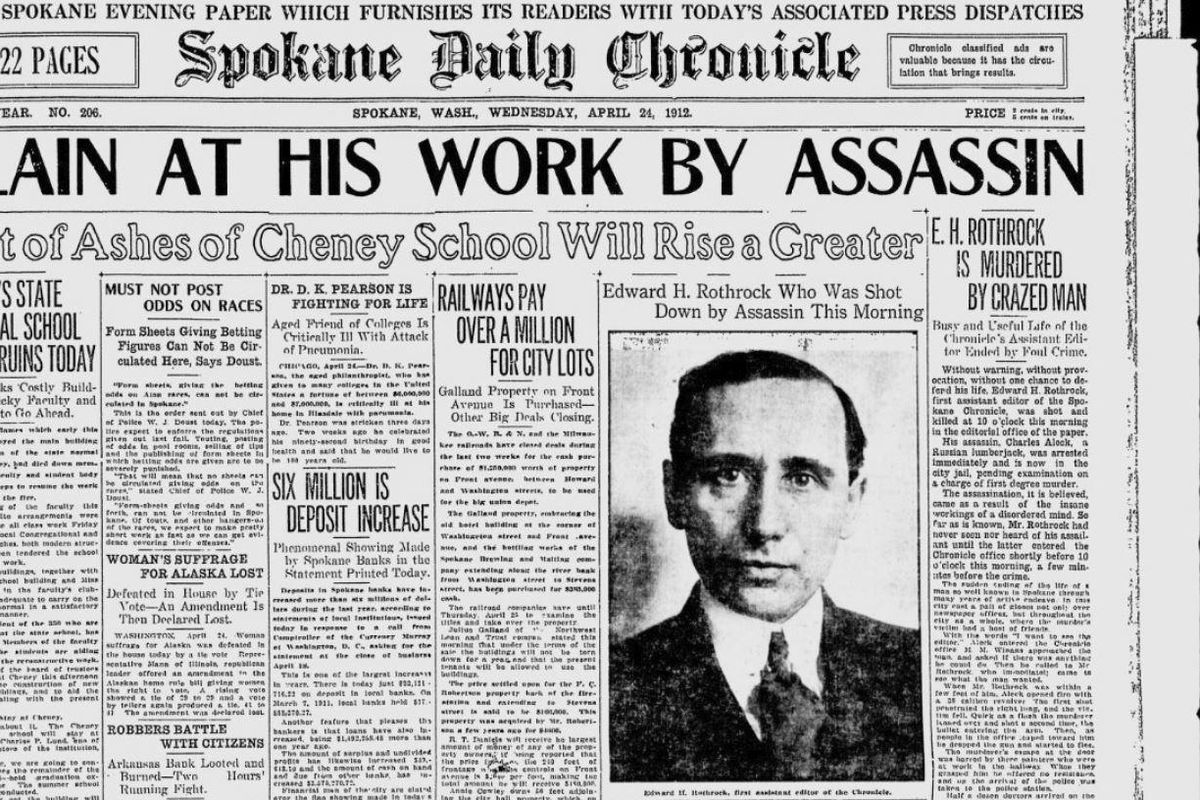Assassin who killed a Spokane Daily Chronicle editor in the newsroom believed he was defamed in Titanic reports

Among the dozens of Spokane-Titanic stories, one stands out as the oddest link between a bustling Western town and a nautical disaster thousands of miles away.
The Titanic was the spark that led a Russian lumberjack to shoot a Spokane Daily Chronicle editor dead in the newsroom on a Wednesday morning in late April 1912.
“SLAIN AT HIS WORK BY ASSASSIN,” the front page headline on the April 24, 1912, edition of the Chronicle read. “E. H. ROTHROCK IS MURDERED BY CRAZED MAN.”
The assailant, Charles Alexiev (also referred to as Aleck in documents at the time), entered the newsroom just before 10 a.m., demanding to see an editor.
Rothrock, the paper’s first assistant editor, asked how he could help. Alexiev shot him, first in the right lung, then in the arm, with a .38-caliber revolver. His flight out the door was stopped by a crew of painters.
Rothrock died on a desk 10 minutes later.
Alexiev’s connection to the Titanic existed only in his own mind, records suggest. He was interrogated by the chief of police and captain of detectives, with help from two Russian interpreters. After a “sweating process” – a term for sustained police questioning that goes over topics again and again until a suspect confesses – Alexiev told police his fellow lumberjacks teased him mercilessly, saying the papers had published a story about him that was “big as the Titanic and Carpathia.”
He had been working at Camp No. 6 in Helmer, Idaho, where he was frequently the butt of jokes due to his illiteracy, the article said. Other records from the time suggested he in fact could read and write, and had a fourth-grade education, though he didn’t speak English.
At trial, Alexiev pleaded not guilty by reason of insanity. A report to the state prison board in June 1912, located by state research archivist Ben Helle, said Alexiev had been committed to Eastern State Hospital for life.
The report goes into more detail about Alexiev’s delusions at the time, saying he “became possessed of the idea that a friend of his … was circulating degrading stories about him of an unprintable character and which stories were referred to by the public by use of the word ‘Titanic.’ ”
The judge and prosecuting attorney who signed the report wrote that his claims of being persecuted appeared to be mostly false, as other witnesses said he typically kept to himself and didn’t affiliate with other workers. The report also lists him as Polish, contrary to newspaper reports.
Alexiev was examined by three alienists, the word at the time for mental health professionals. “The experts say that he was suffering from a form of delusion that is rarely curable,” the report said.
He died in Eastern State Hospital in 1956 at age 76.
The Chronicle’s account is also a tribute to Rothrock, the murdered editor, whom the paper described as an unselfish man who “had made hundreds of true friends and few, if any, enemies.”
The last bit, as any newspaper editor will tell you, was likely an exaggeration.